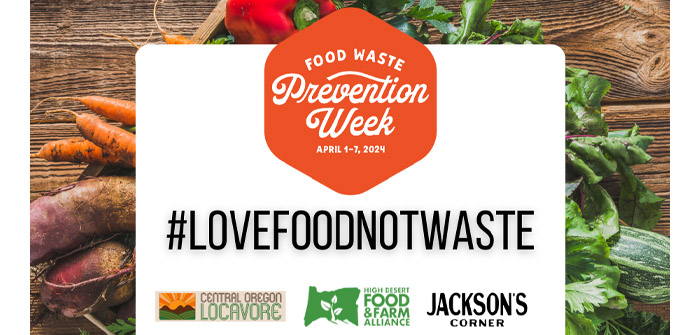(Graphic courtesy of The Environmental Center)
Imagine slipping in two $20 bills each time you take out the trash. The average Oregon household spends $1,800 on wasted and spoiled food each year, which comes out to $150 a month or $35 a week. In addition to the impact on your wallet, one third of all food is wasted, which has the same greenhouse gas emissions impact as 42 coal-fired power plants and uses the same water and energy as 50 million homes. It also makes up the largest category of waste at Knott Landfill which is expected to be full by 2029.
For Food Waste Prevention Week this year, April 1-7, The Environmental Center’s Rethink Waste Project (RWP) is partnering with a handful of local community organizations and businesses to highlight opportunities and challenges throughout the food system: from growing food, to selling it, to making meals with it with minimal waste. Partners in the collaborative #LoveFoodNotWaste social media campaign includes High Desert Food and Farm Alliance (HDFFA), Boundless Farmstead, Central Oregon Locavore, Stephanie at Cook by Color Nutrition, and Jackson’s Corner, to give a wide-ranging perspective throughout the food system. Partners will be sharing their efforts and challenges with reducing food waste, and what they would like Central Oregonians to know. Participation is also welcome and encouraged from community members, with the hope that folks will take this opportunity to share their own tips, successes, and struggles with food waste in their lives.
Sharon Maier-Kennelly, executive director at the High Desert Food and Farm Alliance was happy to join Rethink Waste as a #LoveFoodNotWaste campaign partner. “We love partnering with organizations like The Environmental Center on programs and sharing important messages like preventing food waste,” says Maier-Kennelly. “High Desert Food and Farm Alliance’s Grow and Give program is dedicated to not only preventing food waste, but ensuring nutritious produce is enjoyed by Central Oregonians who need it most. Farming partners throughout the region allow us to glean — collect still healthy, but leftover produce from their farms — that we then bring to our regional food bank, NeighborImpact. Last year we collected 51,475 pounds of fresh, locally grown produce through this program!”
Food Waste Prevention Week is a national concept, so their own website is also filled with helpful tips, informative webinars, and other engaging activities to raise awareness and inspire everyone to reduce food waste wherever they are. For more information, visit foodwastepreventionweek.com.
Why does reducing food waste matter?
- Saves money — A family of four can save an average of $1,800 per year.
- Conserves resources — Land, water, energy and human resources are used to grow, package and transport food.
- Prevention is better — Preventing food waste in the first place has 6-7 times the greenhouse gas reduction potential versus composting alone.
- Improves food security — Safe and nutritious food that is currently thrown away could be rescued to increase access to healthy foods.
The RWP joins various agencies and stakeholders throughout the country in a collaborative effort and shared commitment to reduce food waste. Throughout the week, RWP will be sharing content from our partners and others on The Environmental Center’s social media channels (Instagram @envirocenterbend and Facebook.com/TheEnvironmentalCenter). We also encourage following along with partners to catch all they have to share this week: @foodwastepreventionweek @hdffa @boundlessfarmstead @centraloregonlocavore @cookbycolor @jacksonscornerbend.
Questions about Food Waste Prevention Week, or the Rethink Waste Project, can be directed to Udara via email: udara@envirocenter.org or phone: 541-508-5439.
About The Environmental Center:
The Environmental Center’s mission is to embed sustainability into daily life in Central Oregon. We translate sustainability into practical, local action in order to create a healthy future for people and the planet. We are focused on building community, educating kids, revolutionizing energy, rethinking waste, and advocating for change. Learn more at www.envirocenter.org or by visiting our facility at 16 NW Kansas Ave. in downtown Bend.



